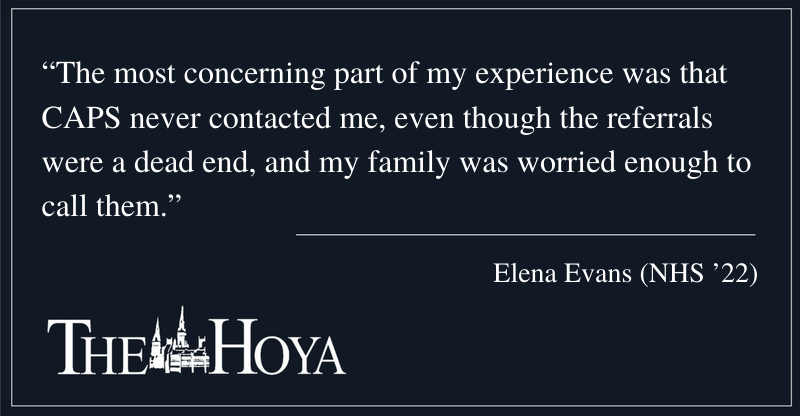After winter break last year, I returned to campus and almost immediately knew something was wrong. Within the first few days of the semester, I found myself teetering between overpowering tears or feeling absolutely nothing. Unfortunately, this situation was not new to me — I’ve struggled with anxiety, depression and chronic physical illnesses my whole life, but this time the sudden intensity scared me. My family history is full of various mental illnesses, so I knew that sometimes these feelings just come and go, especially when there’s a genetic chemical imbalance in play.
Two weeks later, I knew I had to try something because, instead of looking forward to weekends and parties, I spent more time thinking about dying. Nothing in my life was actually wrong, yet I felt like living was no longer sustainable. I wanted to walk into Counseling and Psychiatric Services and feel the weight off my shoulders. I needed to know I wasn’t the only person fighting for me.
I waited about two hours to be evaluated by CAPS. I was frustrated, but I understood, as CAPS has 19 clinical staff members to serve Georgetown University’s over 15,000 students. When I was finally seen, I couldn’t hold in the desperation. I answered the questions, and, with every answer, the risk factors for self-harm and suicide piled up higher and higher. I have chronic illnesses: two to three times more likely to attempt suicide. Family history of mental illness: 2.5 times more likely.
One month before, I had lost a very close family member—his intense depression and mania stopped him from taking the anticoagulation medication that would’ve prevented the multiple strokes that killed him. I specifically said that I didn’t think I could live anymore and that I had cut within the last week.
I was told to email if I wasn’t contacted within two days. I went on a Friday, so I gave them the benefit of the doubt. When I hadn’t heard anything by the next Thursday, I emailed. Nothing. The next day, I sent another saying I was copying my mom on the email because she was very concerned. Two days later I got a response. They said I would get an appointment with an inhouse psychiatrist within two to four weeks, but in the interim I could try contacting two therapists in the city.
I called the hospital three times, leaving voicemails each time, but never heard back. When I tried the numbers CAPS had recommended, the two therapists were not taking new patients or didn’t take insurance. I called CAPS about the situation, and I never heard anything. I never got any emails about other options or about the appointment I was supposedly getting. I didn’t know what to do, so my mom called my primary physician at home and assured her I would see a psychiatrist as soon as possible, but we didn’t know how long it would take. Within two hours, I had a prescription ready at CVS.
I am extremely lucky to have parents who believe in the seriousness of mental illness and that I have a general practitioner who was willing to prescribe anti-anxiety and antidepressant medication from hundreds of miles away. Without the medication, I don’t know what I would have done. I doubt I would be back at Georgetown this year, and I don’t know if I would be anywhere at all.
As someone studying to be a doctor, I know physicians have varying levels of responsibility to follow up with patients who exhibit suicidal tendencies. Washington, D.C. allows breaches of the Health Insurance Portability and Accountability Act and privacy laws to prevent someone from harming themselves or others. The National Suicide Prevention Lifeline published a document in 2018 detailing the standards of care for patients with “elevated risk”: engage the patient with psychological or psychiatric treatment, make the first contact within 24 hours and make the second contact within seven days.
CAPS did not follow a single one of these standards. Allowing me to walk out of the CAPS office and relying on me to follow up was the first act of negligence. It’s hard enough to ask for help when you’re in a dark place, let alone beg those who should be helping you to do their job. The most concerning part of my experience was that CAPS never contacted me, even though the referrals were a dead end, and my family was worried enough to call them. What is even worse is that I’m not the only person with a story like this. If nothing changes, next time there might not be anyone to write about it.
Elena Evans is a sophomore in the School of Nursing and Health Studies.















Robin C • Nov 3, 2019 at 8:50 am
There is no excuse for how this was handled for sure. I hope this brings the issue there to light.
Above all else, please know you have a network you can trust that loves you and you can call on at any time. Your life, all lives, is/are precious, but sometimes it doesn’t feel that way. We all need help and we all need to learn to take off the mask and begin to see how the circumstances we are presented with are not boulders in the path, but opportunities. Please call or reach out and talk. You are here for a very special reason that no one else on earth can fulfill. We need you just as you need us.